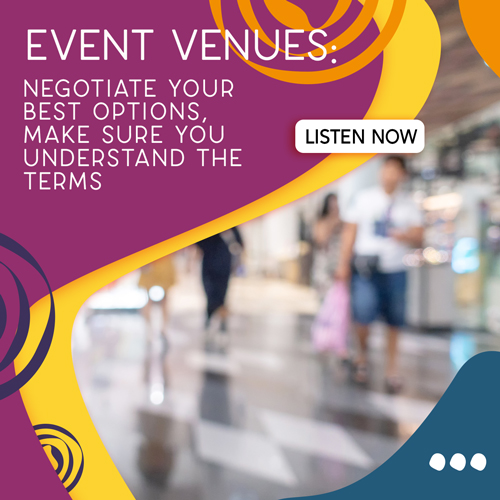
So it’s time to negotiate the contract for your event venue.
You’ve spent a lot of time planning a trade show or conference, and it’s finally time to decide where you are going to host it, and what sort of amenities you are going to provide for attendees, speakers, and sponsors. The next step is choosing your event venue and negotiating the contract.
[LISTEN: iBeacons + Events: 3 Ways to Use Them at Your Next Event – PODCAST EPISODE]
In this episode of the podcast, we’re going to teach you half of what it takes to negotiate with your prospective event venue in order to get the most bang for your buck. It’s not rocket science, or even rocket engineering, but if you’ve never worked with hotels, conference centers, or that type of business, then it can be intimidating and hard to know exactly what you should be pushing for in your contract terms, and where you can find some extra discounts off the list pricing for the line items.
Getting the right location can make or break your event.
If you’re lucky enough to have multiple event venues that you can use, then it’s not that difficult to get them bidding against each other for you business. There are plenty of line items that can be included, comp’d, expanded, etc for your benefit without raising any eyebrows in the accounting department of your host location.
The key here is to know which parts of the contract are the most important to the event venue, versus which ones they have the ability to use as incentives to get your business. It’s also very important to understand how the expected size of your event can impact their bids, and you can’t forget that the type of industry you’re in will also have bearing on their final offers.
[LOOKING FOR PRINT COLLATERAL FOR YOUR EVENT?]
Most hotels, reception venues, conference centers, etc will not tell you in advance where they are willing to play ball with pricing, freebies, inclusions, and so on – it’s not their job to tell you how to cut into their profit margins. They recognize that newbie producers will not be likely to know all the corners they can cut, so they’re not going to cut them unless you request it in their final bids.
Mastering the Art of the Deal: Negotiating Your Event Venue Like a Pro
Securing the perfect event venue is crucial for a successful event, but the price tag shouldn’t break the bank. Negotiating event venue rates can feel daunting, but with the right strategies and a little preparation, event planners and hosts can secure a fantastic space at a budget-friendly price. This guide equips you with the knowledge and tactics to navigate venue negotiations with confidence.
Understanding the Venue’s Perspective:
Before diving into negotiations, understanding the venue’s perspective is key. Venues typically operate with fixed costs for staff, utilities, and maintenance. They aim to maximize revenue while maintaining occupancy rates. Being flexible with dates, times, and off-peak hours can incentivize venues to offer better deals.
Preparation is Key:
1. Research and Know Your Options: Don’t limit yourself to just one venue. Research similar spaces in the area and compare their rates and offerings. This information provides leverage during negotiations and ensures you’re getting the best possible deal.
2. Define Your Needs Clearly: Be clear about your event requirements – number of attendees, desired amenities, catering needs, and technical specifications. This detailed information allows venues to provide accurate quotes and opens the door for negotiation on specific elements.
3. Leverage Your Budget: Be upfront about your budget but have some wiggle room. Present a realistic number while leaving space for negotiation. If budget is tight, explore alternative venues or consider scaling back on non-essential amenities.
Negotiation Tactics:
1. Timing is Everything: Weekdays and off-peak seasons are generally more flexible for venues. Consider these dates to increase your chances of securing a better deal. Negotiations are most effective well in advance of the event date, allowing time for the venue to adjust its schedule.
2. Bundle and Negotiate: Negotiate the entire package, including catering, audio-visual equipment, staffing, and any additional services. Bundling everything together can incentivize the venue to offer a more competitive price.
3. The Power of “Alternatives”: Casually mention alternative venues you’re considering. This can nudge the initial venue to offer a more attractive proposition to secure your business. However, avoid bluffing – only mention venues you’d genuinely consider.
4. Minimize Venue Risk: Offer a lower guaranteed number of attendees with a clause allowing you to increase the number closer to the event date. This minimizes risk for the venue while providing you with some flexibility in managing attendance.
5. Leverage Empty Calendar Slots: If a venue has empty slots on their calendar, they might be more receptive to negotiating on price to fill the gap. Be flexible with your desired date and inquire about potential discounts for less popular times.
Beyond the Basics:
1. Offer Value Propositions: If your event is expected to attract a large crowd or generate significant publicity for the venue, highlight this potential benefit during negotiations. The venue might offer a lower rate in exchange for increased exposure.
2. Explore Barter Opportunities: Consider offering promotional opportunities for the venue in exchange for a discount. This could involve featuring the venue logo in event materials or social media posts. Think creatively about ways to offer value beyond just a financial transaction.
3. The Power of Building Relationships: Develop a rapport with the venue staff. Being polite, professional, and expressing genuine interest in their space can go a long way. Building a positive relationship can increase your chances of securing a favorable outcome.
4. Negotiate Payment Terms: Request a staggered payment plan or negotiate a later due date for a portion of the payment. Better payment terms can alleviate financial pressure on your end, especially for large events.
5. Leverage Unforeseen Circumstances: If unforeseen circumstances arise, like a decrease in expected attendance, approach the venue with transparency. They might be willing to renegotiate catering costs or other elements based on the changed situation.
Things to Look Out for:
1. Hidden Fees: Beware of hidden fees like set-up charges, security deposits, or cleaning costs. Ensure all fees are clearly outlined in the contract before finalizing the agreement.
2. Force Majeure Clauses: Review the contract’s cancellation policies and force majeure clauses. These clauses dictate how unexpected events (like bad weather) affect the contract. Negotiate these terms if they seem overly restrictive.
3. Minimum Spending Requirements: Some venues have minimum spending requirements for food and beverage. Negotiate these requirements to avoid unnecessary spending on catering if you don’t anticipate reaching the minimum threshold.

